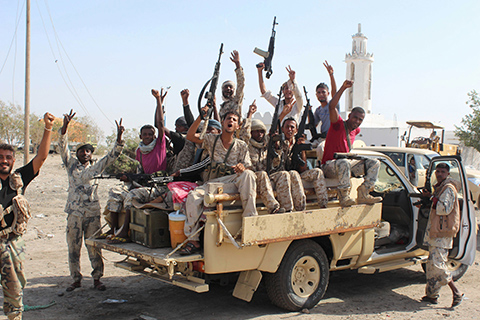 ABYAN, Yemen: Forces loyal to the Saudi-backed Yemeni president brandish their arms at the entrance to this province as they take part in an operation to drive Al-Qaeda fighters out of the southern provincial capital yesterday. - AFP
ABYAN, Yemen: Forces loyal to the Saudi-backed Yemeni president brandish their arms at the entrance to this province as they take part in an operation to drive Al-Qaeda fighters out of the southern provincial capital yesterday. - AFPKUWAIT: Yemen's warring parties held a new session of peace talks in Kuwait yesterday under pressure to firm up a fragile ceasefire that went into effect on April 11. "The meeting has started," Charbel Raji, spokesman for UN envoy Ismail Ould Cheikh Ahmed, told AFP, without providing details. Ould Cheikh Ahmed told a press conference on Friday that the delegations had "constructive" negotiations and were committed to firming up the ceasefire. He acknowledged that the truce was still only between 70 and 80 percent respected and said there were violations by both sides.
Sources close to the government delegation said it would submit a complaint listing 260 ceasefire breaches by the rebels on Friday alone. Rebel delegation spokesman Mohamed Abdulsalam said the priority was to end the fighting that has killed more than 6,800 people and driven 2.8 million from their homes since March last year. "Stopping the war and all forms of military action is the priority of the Yemeni people and the priority of their representatives," he said on Facebook.
Third city Taez, where forces loyal to President Abedrabbo Mansour Hadi have been under rebel siege for months, has been a particular source of friction. Three rebels and two loyalists were killed yesterday in fierce fighting in Kirsh, a town on the main highway to Taez from the southern port of Aden where Hadi's government is based, military sources said. The government delegation is to press for the swift implementation of a package of confidence-building measures agreed at the last -abortive - round of peace talks in Switzerland in December. They include the release of prisoners and the lifting of blockades and other obstacles to the delivery of relief supplies.
The warring sides already carried out two prisoner exchanges last month. The hard-won negotiations in Kuwait opened on Thursday evening following the delayed arrival of representatives of the Shiite Houthi rebels and allied forces loyal to ousted president Ali Abdullah Saleh. The government delegation yesterday said it would only meet Ould Cheikh Ahmed and not sit directly with the Houthis, the source said.
Meanwhile, Yemen's government forces battled Al-Qaeda in the country's south yesterday, aiming to push back advances the militant group has made. Fifteen fighters loyal to Al-Qaeda in the Arabian Peninsula (AQAP) were killed in the clashes, residents and a military source said, while a drone strike killed two others further north. AQAP has taken advantage of chaos in Yemen since its civil war began last year to win control over swathes of southern and eastern Yemen, creating a local government there and introducing services.
Yesterday's clashes at Al-Koud near Zinjibar in the southern Abyan Province were between AQAP and army forces of Yemen's internationally recognized government backed by local militias, referred to locally as the Popular Resistance. In recent weeks Hadi's forces, backed by coalition air strikes, have pushed towards Zinjibar along the beach road from Aden. Koud lies on that road only 5 km from Zinjibar, long considered an AQAP stronghold along with the town of Jaar about 15 km to the north. A group of dozens of AQAP fighters escaped, the military source said, adding that two army soldiers were also killed.
Also yesterday, an air strike from a drone killed two men south of the Yemeni city of Marib suspected of belonging to Al-Qaeda, local residents said by phone. The United States has used drone strikes in Yemen to target AQAP leaders, the global jihadist group's local wing, which has plotted to place bombs on international airliners and has encouraged attacks in Western countries. - Agencies










